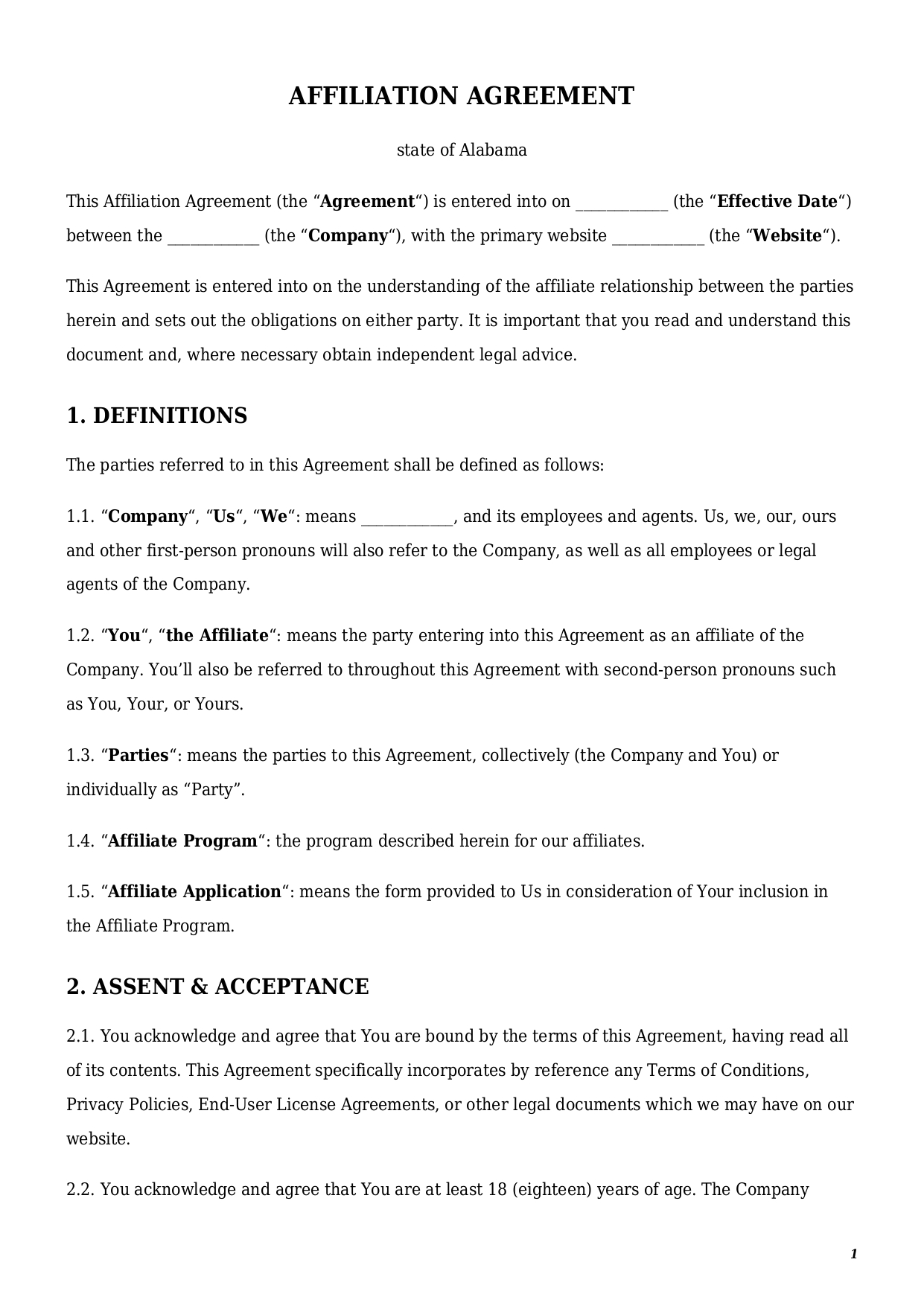Affiliation Agreement
Reviews


What Is an Affiliation Agreement?
An affiliation agreement, also known as an affiliate agreement, is a legal contract defining the relationship and terms related to the promotion of specific ventures, activities, goods, or services on the Internet.
The affiliate agreement spells out:
- specific responsibilities of both parties;
- financial and payment terms for the affiliate;
- additional benefits;
- acceptable marketing behavior; and
- dispute resolution clause.
An affiliation agreement should not be confused with a marketing agreement. While both documents are focused on promotions of goods and services, they remain different documents. A marketing agreement is a more complex legal arrangement that involves sophisticated marketing strategies. A marketer should have specific skills, knowledge, and expertise to advise regarding marketing campaigns.
Contrary to that, anyone above the age of 18 can enter the affiliate agreement. Usually, the entire agreement represents a set of rules and guidelines an affiliate has to follow in order to promote goods and services.
An affiliation agreement can be concluded in the form of a letter agreement when a third party simply joins the existing affiliate program. In that case an affiliate does not have a chance to change the terms and conditions of the affiliate program established by the business owner. It is also possible that an affiliation agreement is being signed as a normal contract. This is when parties negotiate on possible terms of cooperation; thus, the affiliate agreement template reflects the needs of both parties in full.
Why use affiliation agreements?
When clients ask us what the reason is for having a written affiliation agreement, we always bring to the table the pros mentioned below:
Brings Clarity of Terms
Once parties decide to form an agreement for affiliate cooperation, it guarantees 100% clarity for future relationships. For example, parties agree that the payout of a commission should take place every month. While the affiliate expects a payment to be released at the beginning of the new month, a company may have other plans. This is where clarifying all tiny details well in advance saves you from potential future disputes.
Protects Intellectual Property
When the affiliate promotes your company’s goods or services, they technically represent a company’s brand. Since a company’s brand is the most valuable asset, it should enjoy the highest level of protection. There are a lot of practical examples of brand abuse in the course of affiliate programs. For example, negative representation or provision of misleading advertising information. Thus, a written affiliate agreement template defines the exact do’s and don’ts an affiliate is allowed to do.
Ensures legal protection
Having a written affiliate agreement template legally binds both parties. It proves that parties agreed upon certain terms of cooperation. Thus, even if there is any dispute in the future, either party can easily stand their ground in the court.
Guarantees predictability for both parties
Both parties have clear expectations of each other. Thus, an affiliate marketing agreement acts as a road map, helping to guide parties in their partnership. For instance, either party gets clear payments and an exit strategy they can implement anytime.
Key Clauses in Affiliation Agreements
All affiliation agreements are different; thus, there is not a unified set of clauses each document should have. At the same time, a well-written agreement for affiliate collaboration should include the mandatory elements below:
Parties Involved
This is a vital part of every legal contract, as the party that is mentioned in the contract is obliged under such a contract. Make sure all names and addresses are written accurately. Besides that, do not forget to add contact email addresses for both parties to ensure smooth communication.
Scope of Affiliation
This part of the affiliate marketing agreement describes the type of affiliate cooperation:
Promotion of Goods or Services
This type of affiliate collaboration includes promotion of certain types of company goods and services. In that case the affiliation agreement should contain information about the exact goods or services the affiliate should promote. The more detailed information is given, the better.
Promotion of Website and/or Apps
Another type of affiliation collaboration is a promotion of certain links to one or several websites. It can also be promotion of different apps as well.
Another contract type of an affiliation agreement may include promotion of goods, services, and websites.
Once the type of collaboration is chosen, parties have to consider carefully how the success should be measured. An affiliate agreement typically includes the following tools to measure the progress:
- establishment of specific benchmarks;
- provision of specific deliverables or performance metrics; or
- introduction of KYIs.
Payment Details
This part of an affiliate marketing agreement addresses how and when payouts of commissions should be made. This section needs to be crystal clear to avoid any confusion or delays in payment. Ambiguity in payment terms is a frequent cause of disputes.
Type of commission
This is how an affiliate’s commission is being calculated; they are:
- Pay per click. When an affiliate gets a commission in an agreed amount once a user clicks on a link;
- Pay per purchase. When an affiliate gets a commission each time a user makes a purchase following an affiliate’s link;
- Pay per lead. When an affiliate gets a commission every time a user makes a certain action (e.g., subscribes, answers questions in the form, etc.);
- Revenue share commission. When an affiliate gets a portion of a company’s revenue; or
- Third-party commission. When an affiliate gets commission for introducing new affiliates to the program.
Payment Method and Frequency
An affiliate agreement contract should also define how exactly commission should be paid out to the affiliate.
Frequency of payments should also be established (e.g., monthly, weekly). It is also to set up additional restrictions for payout. For example, an affiliate is required to promote the company’s products for a minimum period of time to be eligible for a payout.
Calculation method
Inaccurate amounts of commission may significantly undermine trust between the partners. Thus, a solid sample affiliate agreement should define calculation methods to ensure transparency. The agreement should also clarify how returns, refunds, or chargebacks affect commissions already paid or due.
Additional expenses
If in the course of affiliate promotion of goods or services an affiliate may encounter additional expenses, those expenses should also be addressed in the text of the final affiliation agreement.
Additional expenses may include Internet, electricity, or phone bills, as well as various transportation expenses. Even if the affiliation agreement confirms compensation of such additional expenses, the following things need to be considered further:
- limitation of types of expenses that could be compensated;
- establishment of a maximum monthly threshold for compensation of expenses; and
- submission of documents proving occurrence of additional expenses.
Confidentiality Agreement
Once an affiliate joins the affiliate program, they might be exposed to a company’s sensitive information with limited public access. Such information may include, for instance, details about the affiliate training programs. It may also give an affiliate access to certain financial information, including accounts receivable under the affiliate program, and many more.
Therefore, protection of confidential information is vital. Usually an affiliate undertakes to not disclose confidential or sensitive information during the whole period of participation in the affiliate program.
Protection of Intellectual Property
The affiliation agreement must clearly state who owns any new ideas, inventions, branding, or creative works developed jointly during the affiliation. It should also detail how pre-existing IP owned by each party can be used by the other, often through a limited license for the duration of the agreement and specific to its purpose.
One more thing to consider is the list of things an affiliate should not be allowed to do with a company’s brand, identity, or trademarks.
Term and Termination
This clause defines the lifespan of the affiliation agreement and outlines valid reasons for its termination. The affiliate agreement contract’s duration depends on a subject matter and on the wishes of the parties.
For a termination process, parties have to agree on the number of days’ notice either party has to send to inform about the contract’s termination.
Table of content
Frequently Asked Questions (FAQ)
-
1. How do affiliate contracts work?
An affiliate agreement contract is aimed at defining the terms and conditions of a partnership where one party (the affiliate) promotes another company’s products or services in exchange for a commission on sales or leads generated through their referral.
This is a popular type of contract for online marketing.
-
2. Who pays affiliate fees?
Affiliate fees are being paid by a company whose goods or services are being promoted by a party known as an affiliate.

Looking for something Different?
Start typing to find out our collection of legal documents and contract templates
